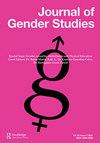承认、公民身份和权利:从《跨性别者(权利保护)法》看印度性别不合社区的困境
IF 1.5
3区 社会学
Q2 SOCIAL ISSUES
引用次数: 0
摘要
本文章由计算机程序翻译,如有差异,请以英文原文为准。
Recognition, citizenship and rights: the dilemma of India’s gender non-conforming communities in the light of the Transgender Persons (Protection of Rights) Act
ABSTRACT Recognition and citizenship issues play pivotal roles in understanding the complex interaction between different forms of inequalities. Citizenship should be treated as a practice intimately linked with individuals’ identities and rights, their sense of belonging and their actual nature of participation in the different spheres of their life. Exclusion is not just deprivation from the more tangible economic and social processes but also denying people their voice and their right to be unique. In this context, the Transgender Persons (Protection of Rights) Act concerning India’s transgender community lies within the crucial junctures of identity politics and the country’s legal and social structures. This work critically analyses the TG Act and raises few questions on the nature of recognition given to transgender individuals. Does a transgender person get citizenship that guarantees representation and equality? To what extent does the new Act do justice to the transgender community in living as a member of the society and not just as a product of ‘othering’? The paper concludes that recognition is not just for citizenship and identity rights – it is the right to be different but equal.
求助全文
通过发布文献求助,成功后即可免费获取论文全文。
去求助
来源期刊

Journal of Gender Studies
Multiple-
CiteScore
4.40
自引率
0.00%
发文量
52
期刊介绍:
The Journal of Gender Studies is an interdisciplinary journal which publishes articles relating to gender from a feminist perspective covering a wide range of subject areas including the Social and Natural Sciences, Arts and Popular Culture. Reviews of books and details of forthcoming conferences are also included. The Journal of Gender Studies seeks articles from international sources and aims to take account of a diversity of cultural backgrounds and differences in sexual orientation. It encourages contributions which focus on the experiences of both women and men and welcomes articles, written from a feminist perspective, relating to femininity and masculinity and to the social constructions of relationships between men and women.
 求助内容:
求助内容: 应助结果提醒方式:
应助结果提醒方式:


